News
Trump triples down on racism, changes asylum rules; tick-tock of a tipping point
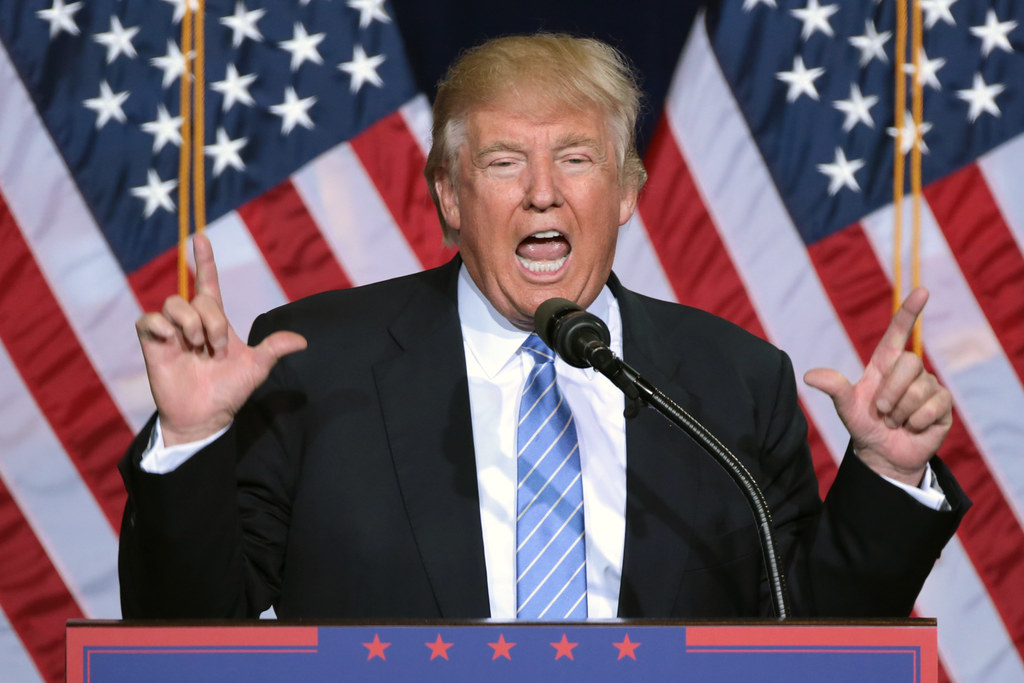

Donald Trump’s normalized habit of creating distractions may have reached a tipping point Monday, July 15, as the president instigated a white nationalist twitter attack against four duly elected women of color in Congress and announced a new policy that essentially ends asylum in the US, potentially condemning terrified and tortured LGBT asylum seekers to their deaths.
Trump’s public throw-down telling progressive Democratic LGBT allies Reps. Alexandria Ocasio-Cortez (from the Bronx), Ilhan Omar (of Minnesota), Rashida Tlaib (of Michigan) and Ayanna S. Pressley (of Massachusetts) – nicknamed “the Squad” — to “go back” where they come from was considered so overtly racist, even journalistic standard-bearer The Associated Press called Trump’s tweets “racist” in a headline.
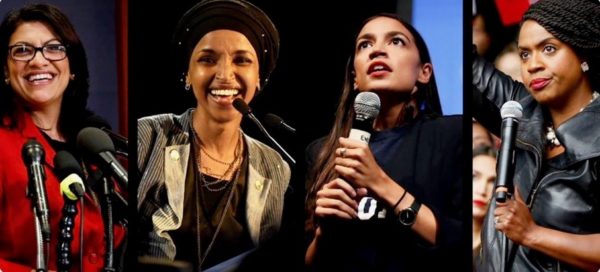
But political hate rhetoric has consequences. Trump’s cult followers such as mail-bomb suspect Cesar Sayoc are known to take action and a gunman attacked on Republicans warming up for a congressional baseball game. After Trump’s tweets, House Homeland Security Chairman Bennie Thompson asked Senate Sergeant-at-Arms Michael Stenger about the need for increased protection. “The President’s rhetoric may insinuate more attacks on members of Congress,” Thompson wrote.
The political and cultural significance has been so jarring that historians may well regard July 2019 as the moment when the 2020 elections started to boil down to candidates either supporting white supremacy or advocating for diversity.
And it may have all started as a distraction. Trump needed to divert media scrutiny away from his association with billionaire registered sex offender Jeffrey Epstein— and his heavily criticized Labor Secretary, Alexander Acosta, who, as a Florida federal prosecutor, had given Epstein a sweetheart deal in 2008. Suddenly, the day before Acosta resigned, the New York Times reported on Thursday, July 11 about a new plan for massive ICE sweeps of undocumented immigrants.
This was an abrupt reversal of Trump’s scuttled previous announcement of ICE “removing the millions of illegal aliens,” tweeted on June 17. This time, there was a list of 2,000 “criminals” with final deportation orders who could expect shock-and-awe-like ICE sweeps in 10 named cities, including Los Angeles, on Sunday, July 14. The Los Angeles Times pointed out the irony of Trump having called Oakland Mayor Libby Schaaf’s announcement of an impending ICE raid last year a “disgrace.”

The ICE raid was a harsh counter to extensive media and social media coverage of the Squad criticizing the inhumane treatment of migrants, including caged separated children, after their July 1 tour of detention centers in El Paso and Clint, Texas. The ACLU reports that despite a court-ordered injunction, Trump’s child-separation policy is still in effect, where an infant can be taken from its “unfit” mother for a years-old traffic violation.
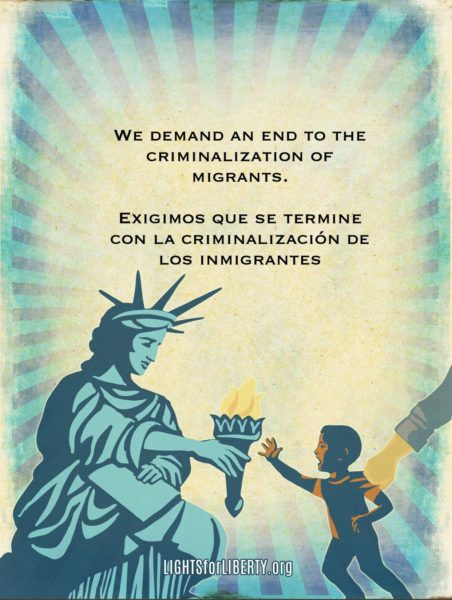
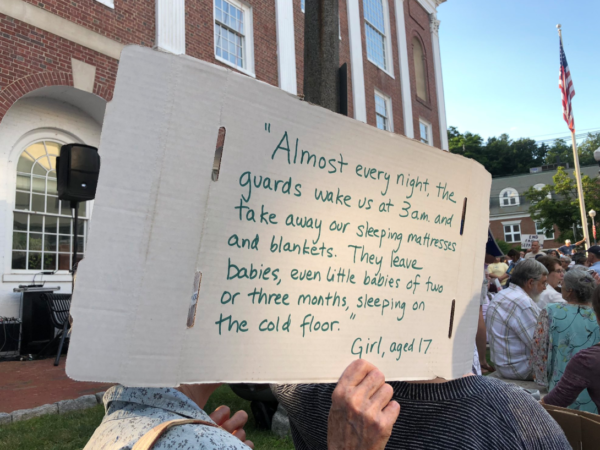
Lights for Liberty organized 800 rallies around the country on Friday night, July 12 protesting the expected massive ICE raids and alerting immigrant families about their rights.
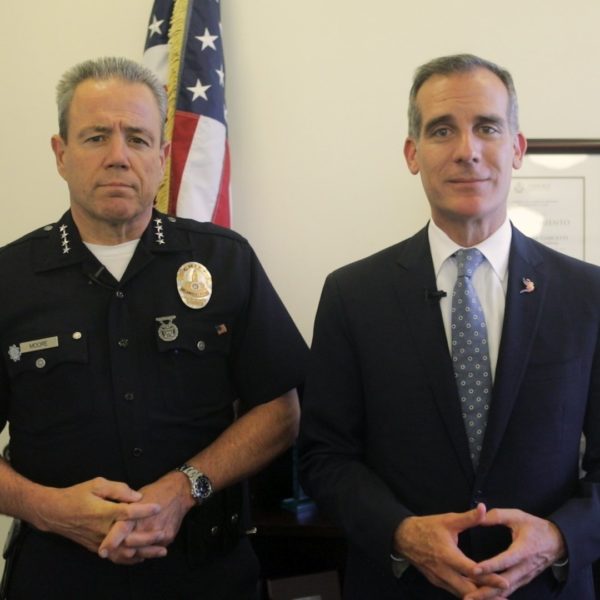
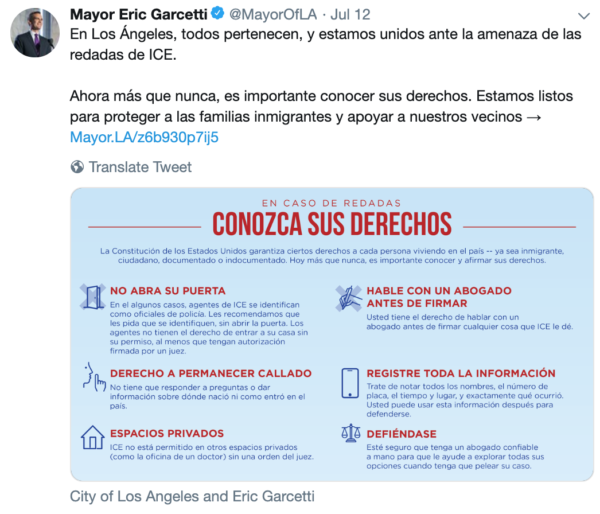
LA Mayor Eric Garcetti and LAPD Police Chief Michel Moore took to Twitter to alert undocumented people that law enforcement would not help ICE in the raids. They also posted “know your rights” cards.
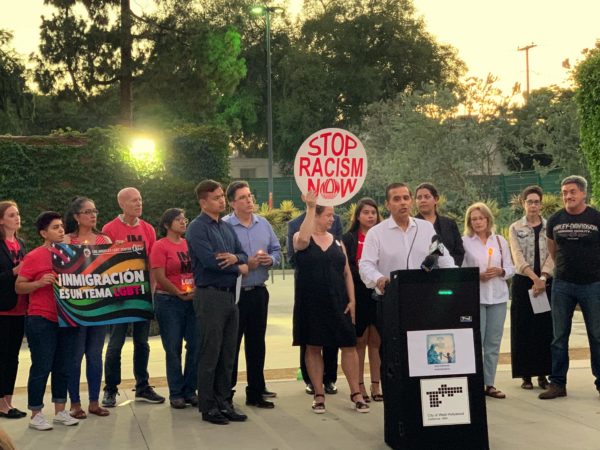
Antonio Villaraigosa at rally (photo courtesy John Duran/Facebook)
About 400 people rallied in downtown LA, while a much smaller group gathered in West Hollywood Park to hear former LA Mayor Antonio Villaraigosa, local leaders and several members of the West Hollywood City Council decry Trump’s inhumanity towards immigrants and asylum seekers.

As thousands protested, Vice President Mike Pence visited two migrant detention centers in Texas, one with children and the other a Border Patrol station near McAllen with nearly 400 men crammed inside a cage. Some of the detainees said they had been there for more than 40 days, were hungry, and could not shower or brush their teeth.

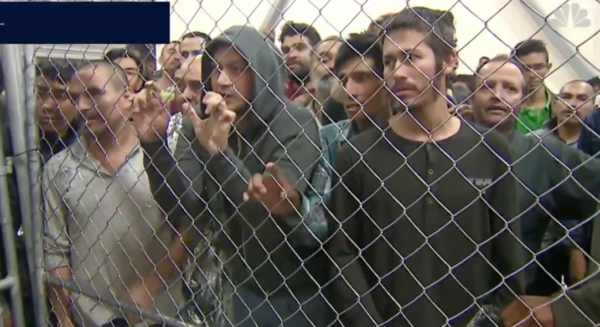
According to the pool reporter from Politico: “The stench was horrendous. The cages were so crowded that it would have been impossible for all of the men to lie on the concrete.”
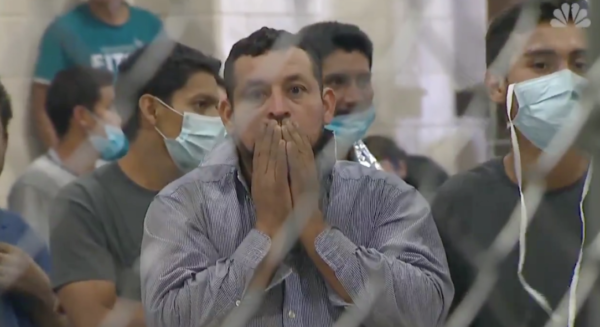
“I was not surprised by what I saw,” Pence said later. “I knew we would see a system that was overwhelmed. This is tough stuff.” He blamed Democrats for the situation.
Meanwhile, on a quieter parallel track, an internal Democratic Caucus dispute was developing between the Squad and Speaker Nancy Pelosi over the inadequacies of an emergency border aid package. The dispute intensified after AOC’s chief of staff, Saikat Chakrabarti, called out Rep. Sharice Davids, a moderate out lesbian Democrat and Native American from Kansas, for voting for the aide bill.
Chakrabarti, in a tweet he later deleted, wrote that the liberals “certainly seem hell bent to do to black and brown people today what the old Southern Democrats did in the 40s.” Of Davids, he tweeted: “I don’t think people have to be personally racist to enable a racist system.”
Friday night, the House Democratic Caucus’s official Twitter account slapped back: “Who is this guy and why is he explicitly singling out a Native American woman of color?”
Saturday, a pall hung over the City of Angeles as undocumented immigrant families, friends, allies and advocates cowered in fear, having heard that anyone nearby, even US citizens, could be swept up as “collateral” damage during the raids.
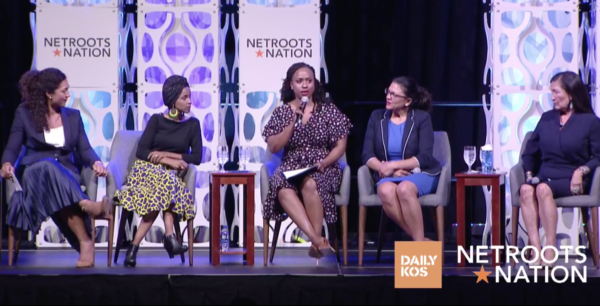
At a Netroots Nation panel Saturday morning, three members of the Squad shared their experiences and were received as rock stars. They also encouraged conference attendees (including TransGriot’s Monica Roberts) to run for elective office – but only as their authentic selves.
“We don’t need any more brown faces that don’t want to be a brown voice,” Pressley said. “We don’t need anymore black faces that don’t want to be a black voice. We don’t need any more Muslim faces who don’t want to be a Muslim voice. We don’t need any more queers that don’t want to be a queer voice.”
On another panel, Omar, who came to the US from Somalia as a child, talked about criticism of her as unAmerican. “I believe, as an immigrant, I probably love this country more than anyone that is naturally born,” she said.
“We export American exceptionalism—the great America, the land of liberty and justice. That is, you ask anybody walking on the side of the street somewhere in the middle of the world, they will tell you: ‘America the great.’ But we don’t live those values here,” Omar said. “And so that hypocrisy is one that I’m bothered by, I want America the great to be America the great.”
Sunday, the waiting was unbearable. But he shock and awe didn’t materialize. Some pundits questioned whether inflicting trauma, fear and intimidation was Trump’s sole intention.
Bamby Salcedo, founder and CEO of the LA-based TransLatin@ Coalition, noted it was Sunday, when most undocumented immigrants do not work. Normally, “ICE preys on people” in the early morning hours or at work.

“Trump and ICE said they were only targeting criminals. But that’s not true because in their minds, all of us are criminals. Everybody who comes from Mexico—I’m part of that—people who come from ‘shit-hole’ countries. People from Central America. Muslims. All people of color in his eyes are criminals,” Salcedo tells the Los Angeles Blade.
“We have seen all those images [of migrants in cages] and images don’t lie about the realities of people,” says Salcedo. “This administration knows what is happening because this is what they think of us—as criminals….This is completely inhumane. They are violating the human rights of people.”
Additionally, the detention facilities are privately run or owned with contractors making $750 per day per warehoused person.
“ICE is a monster money-making machine,” says Salcedo. “They found a way to create wealth by caging people.”
Trump also used Sunday morning to unleash a Twitter tirade attacking the Squad, all U.S. citizens, three of whom are American-born and one, Rep. Ilhan Omar, a naturalized citizen like Trump’s wife Melania.
Trump tweeted: “So interesting to see ‘Progressive’ Democrat Congresswomen, who originally came from countries whose governments are a complete and total catastrophe, the worst, most corrupt and inept anywhere in the world (if they even have a functioning government at all), now loudly and viciously telling the people of the United States, the greatest and most powerful Nation on earth, how our government is to be run. Why don’t they go back and help fix the totally broken and crime infested places from which they came. Then come back and show us how it is done.”
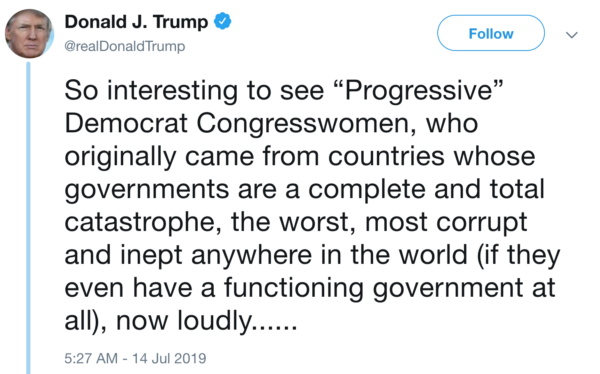
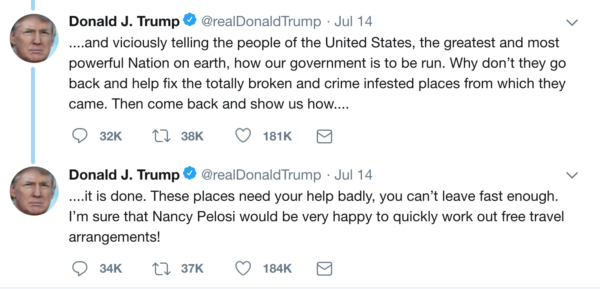
As Democrats cried foul, news outlets noted the deafening silence of Republicans. “Are you OK with a racist president, Republicans?” asked the editorial board of the Charlotte Observer, the newspaper of record in the city that will host the Republican National Convention in August 2020.
“’Go back where you came from’ is among the worst of racist tropes. It divides us by ethnicity and skin color. It says that even if someone is a citizen or legal immigrant, they are not part of the rest of us. That runs contrary to who we should be as Americans,” they wrote.
Trump sloughed off the criticism, saying the centers had received “great reviews” and the overcrowded adult male areas were “loaded up with a big percentage of criminals.”
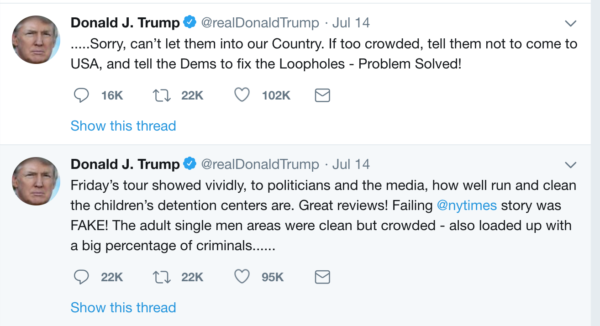
On Monday, July 15, as a judge heard arguments for granting bail to billionaire Jeffrey Epstein, and more Russian interference news broke in advance of Special Counsel Robert Mueller’s appearance before Congress—Trump threw his white supremacist base more raw red meat. He defended his racist remarks at a White House event, alleging the four women of color “hate our country” and are “free to leave if they want.” He also repeatedly alleged that Omar is a Qaeda sympathizer — a false charge.
Trump said he was unconcerned that his tweets were racist. “It doesn’t concern me, because many people agree with me,” he said, such as these white supremacists. “All I’m saying is if they want to leave, they can leave now.”
The four women, Trump said, “are people that hate our country. They hate our country. They hate it, I think, with a passion.”
And, contrary to evidence, Trump said the ICE raids “were very successful….Many, many were taken out on Sunday, you just didn’t know about it.”
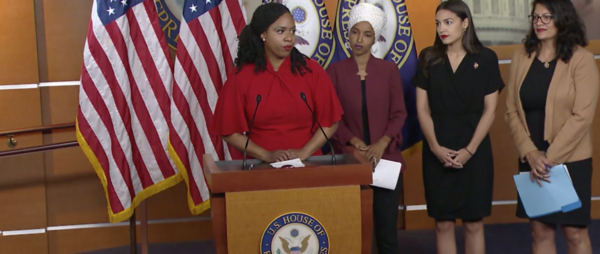
On the other side of Pennsylvania Avenue, the Squad showed their mettle.
“We ran on a mandate to advocate for and represent those ignored, left out and left out and left behind,” Pressley said. “Our squad is big. Our squad includes any person committed to building a more equitable and just world, and that is the work that we want to get back to…And given the size of this squad and this great nation, we cannot, we will not be silenced.”
“This is the agenda of white nationalists,” Omar said. “He would love nothing more than to divide our country based on race, religion, gender, orientation, or immigration status.”
“We don’t leave the things that we love. And when we love this country, that means we propose the solutions to fix it,” said AOC.
“Sadly, this is not the first nor will it be last time we hear disgusting, bigoted language from the President,” said Tlaib, who joined Omar in calling for impeachment.
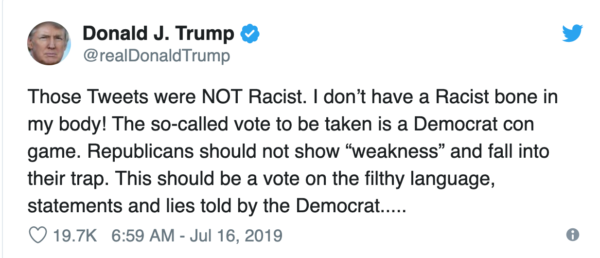
Trump took to Twitter again on Tuesday, asserting that his tweets were not racist. “I don’t have a racist bone in my body,” he tweeted. California Republican Minority Leader Kevin McCarthy held a news conference backing him up, saying the tweets were not racist. “I believe this is about ideology. This is about socialism versus freedom.” He is counseling his Republican Caucus to vote “No” on a resolution condemning Trump’s racist remarks.
Some Republicans, such as former Trump advisor Anthony Scaramucci, thought Trump’s comments were racist.

California Rep. Karen Bass, Chair of the Congressional Black Caucus, told MSNBC that Republicans who used to tell her privately that they were embarrassed by Trump haven’t approached her over his tweets.
“He always throws a racist bomb when he wants to divert our attention,” Bass said, noting the upcoming Mueller hearing. “But I am seriously worried about the lives of our four members,” worried that Trump’s racist hateful rhetoric “will trigger somebody.” Bass agreed that Trump “already has” blood on his hands.
Meanwhile, as the country convulses over Trump’s overt racism, many LGBT leaders are worried over the grave consequences for LGBT asylum seekers and how other countries may now also feel free to end their asylum policies.
“The new rule, published in the Federal Register and set to take effect Tuesday, would bar asylum claims from anyone who has passed through another country en route to the U.S., which essentially would cover anyone other than Mexican residents, who make up a small fraction of asylum applicants,” the LA Times reports. “Only in rare cases, such as when a migrant applies for asylum elsewhere and is denied, would a person be eligible to apply for protection in the U.S.”
“This rule is inconsistent with both domestic and international law, and we intend to sue immediately to block it,” said Lee Gelernt, deputy director of the ACLU’s national Immigrants’ Rights Project, who filed suit in San Francisco federal court Tuesday. “If allowed to stand, it would effectively end asylum at the southern border and could not be more inconsistent with our country’s commitment to protecting those in danger.”
The rule requires migrants to apply for asylum in their country of origin or a “safe third country,” which for migrants who travel from South and Central America means Mexico, which denies 75% of petitions for asylum.

Trans asylum seekers are particularly vulnerable. Two trans women, Roxana Hernández and JohanaMedina, died in ICE custody. Another, Camila Díaz Córdova, was murdered when she was returned to El Salvador, the country she fled.
“Right now in TJ (Tijuana) the situation is really bad for LGBTQ people, specially for Central American trans women. It is not safe at all,” Salcedo tells the Los Angeles Blade. “What this administration wants to do is really eliminate the right of people for asking for asylum. Seeking asylum is a human right, but obviously, this administration does not see certain people as humans.”
Out LA Councilmember Mitch O’Farrell and Equality California Executive Director Rick Zbur were part of a delegation that visited the LGBT center, Jardín de Las Mariposas, in Tijuana.
“I have seen first-hand the humanitarian crisis at our border with Mexico, a situation made worse by the inhumane and racist policies of Donald J. Trump,” Farrell tells the Los Angeles Blade. “His recent order requiring that asylum seekers to the United States petition their country of origin first is yet another step in his efforts at normalizing the pain and suffering of migrants from Central America. This puts everyone who dreams of becoming an American– and hoping for a better life– directly in harms way, including those who identify as LGBT who are already facing persecution at home.”
“Seeking asylum is a legal right under American law and a matter of life and death for many LGBTQ people escaping danger and persecution,” says Zbur. “We’ve seen first-hand the crisis at our southern border, but make no mistake: the crisis has been created by the Trump-Pence Administration — not asylum seekers. We in California will continue to show compassion for immigrants even when this Administration attempts to close the door on them.”
Speaker Pelosi set Tuesday night for a vote on a resolution in which the House “strongly condemns President Trump’s racist comments that have legitimized increased fear and hatred of new Americans and people of color.”
“Let me be clear, our caucus will continue to forcefully respond to these disgusting attacks [against the Squad],” Pelosi said. “The House cannot allow the president’s characterization of immigrants to our country to stand. Our Republican colleagues must join us in condemning the president’s xenophobic tweets.”
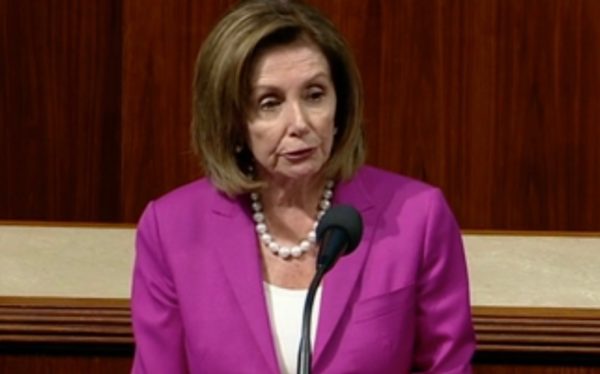
Dateline: July 16. America bears witness to chaos and a House divided.
The House voted 240 to 187 along party lines, joined by four Republicans— Will Hurd, Brian Fitzpatrick, Fred Upton and Susan Brooks—and now independent Justin Amash—to condemn Trump for his racist remarks.
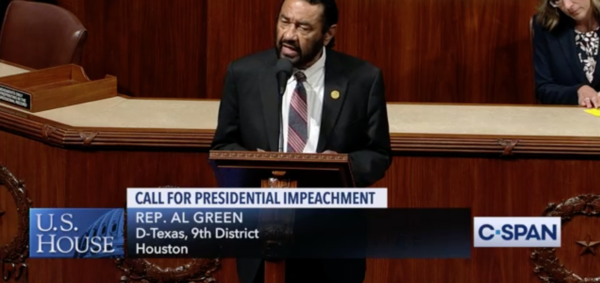
Immediately after the vote, Rep. Al Green announced his intention to file articles of Impeachment against President Donald J. Trump.
What happens from now until November 2020 may determine the fate of American democracy.
Arts & Entertainment
2026 Most Eligible LGBTQ Singles nominations
We are looking for the most eligible LGBTQ singles in Los Angeles

Are you or a friend looking to find a little love in 2026? We are looking for the most eligible LGBTQ singles in Los Angeles. Nominate you or your friends until January 23rd using the form below or by clicking HERE.
Our most eligible singles will be announced online in February.
Minnesota
Reports say woman killed by ICE was part of LGBTQ community
Renee Nicole Good shot in Minneapolis on Wednesday

A U.S. Immigration and Customs Enforcement agent shot and killed a woman in Minneapolis as she attempted to drive away from law enforcement during a protest on Wednesday.
The Star Tribune newspaper identified the victim as Renee Nicole Good, 37, a Minneapolis resident who lived blocks from where she was shot in the Central neighborhood, according to reports. Donna Ganger, Good’s mother, told the Star Tribune that her daughter lived in the Twin Cities with her wife.
Multiple videos of the shooting have gone viral on social media, showing various angles of the fatal incident — including footage that shows Good getting into her car and attempting to drive away from law enforcement officers, who had their weapons drawn.
In the videos, ICE agents can be heard telling Good to “get out of the fucking car” as they attempted to arrest her. Good, who press reports say was married to a woman, ended up crashing her car into an electric pole and other vehicles. She was later transported from the scene of the shooting and died at the hospital.
President Donald Trump defended the ICE agent on Truth Social, saying the officer was “viciously” run over — a claim that coincides with Homeland Security Secretary Kristi Noem’s assessment of the situation. Noem, a South Dakota Republican, insisted the officer “fired defensive shots” at Good after she attempted to run over law enforcement agents “in an attempt to kill them — an act of domestic terrorism.”
Multiple state and local officials disputed claims that the shooting was carried out in self-defense at the same time Noem was making those assertions.
An Instagram account that appears to belong to Good describes her as a “poet and writer and wife and mom and shitty guitar strummer from Colorado; experiencing Minneapolis, MN,” accompanied by a rainbow flag emoji.
A video posted to X after the shooting shows a woman, reportedly her wife, sitting on the ground, crying and saying, “They killed my wife. I don’t know what to do.”
“We’ve dreaded this moment since the early stages of this ICE presence in Minneapolis,” Mayor Jacob Frey said during a Wednesday press conference. “Having seen the video myself, I want to tell everybody directly that [the DHS’s claim of self-defense] is bullshit. This was an agent recklessly using power that resulted in somebody dying, getting killed.”
“I have a message for ICE. To ICE, get the fuck out of Minneapolis,” Frey continued. “We do not want you here. Your stated reason for being in this city is to create some kind of safety, and you are doing exactly the opposite. People are being hurt. Families are being ripped apart. Long-term Minneapolis residents that have contributed so greatly to our city, to our culture, to our economy are being terrorized, and now somebody is dead. That’s on you, and it’s also on you to leave.”
Across the Capitol, members of the House and the Senate condemned the actions of the officer.
“There’s no indication she’s a protester, there’s nothing that at least you can see on the video, and therefore nothing that the officers on the ground could see that identify her as someone who’s set out to try to do harm to an ICE officer,” U.S. Sen. Elizabeth Warren (D-Mass.) said Wednesday night on MS NOW’s “The Weeknight.”
“There is no evidence that has been presented to justify this killing,” House Minority Leader Hakeem Jeffries (D-N.Y.) said in a statement on his website. “The masked ICE agent who pulled the trigger should be criminally investigated to the full extent of the law for acting with depraved indifference to human life.”
“ICE just killed someone in Minneapolis,” U.S. Rep. Robert Garcia (D-Calif.) the highest-ranking Democrat on the House Oversight Committee, posted on X. “This administration’s violence against communities across our country is horrific and dangerous. Oversight Democrats are demanding answers on what happened today. We need an investigation immediately.”
In a statement to the Advocate, Human Rights Campaign President Kelley Robinson wrote, “Today, a woman was senselessly killed in Minneapolis during an ICE action — a brutal reminder that this agency and the Trump regime put every community at risk, spreading fear instead of safety. Reports that she may have been part of the LGBTQ+ community underscore how often the most vulnerable pay the highest price.”
National LGBTQ Task Force President Kierra Johnson also responded to Good’s death.
“We recognize and mourn the loss of Renee Nicole Good and extend our condolences to her family, loved ones, and community,” said Johnson in a statement. “This loss of life was preventable and reprehensible, particularly coming at the hands of federal agents.”
Colombia
Gay Venezuelan man who fled to Colombia uncertain about homeland’s future
Heberth Aguirre left Maracaibo in 2018

BOGOTÁ, Colombia — A gay Venezuelan man who has lived in Colombia since 2018 says he feels uncertain about his homeland’s future after the U.S. seized the now former Venezuelan President Nicolás Maduro.
“On one hand I can feel happy, but on the other hand I feel very concerned,” Heberth Aguirre told the Washington Blade on Tuesday during an interview at a shopping mall in Bogotá, the Colombian capital.
Aguirre, 35, is from Maracaibo, Venezuela’s second-largest city that is the heart of the country’s oil industry.
He developed cultural and art initiatives for the Zulia State government.
“Little by little, I suddenly became involved in politics because, in a way, you had to be involved,” recalled Aguirre. “It was necessary to be involved because the regime often said so.”
“I basically felt like I was working for the citizens, but with this deeply ingrained rule we had to be on their side, on the side of the Maduro and (former President Hugo) Chávez regime,” he added.
Maduro in 2013 became Venezuela’s president after Chávez died.
“There are things I don’t support about the regime,” Aguirre told the Blade. “There are other things that were nice in theory, but it turned out that they didn’t work when we put them into practice.”
Aguirre noted the Maduro government implemented “a lot of laws.” He also said he and other LGBTQ Venezuelans didn’t “have any kind of guarantee for our lives in general.”
“That also exposed you in a way,” said Aguirre. “You felt somewhat protected by working with them (the government), but it wasn’t entirely true.”
Aguirre, 35, studied graphic design at the University of Zulia in Maracaibo. He said he eventually withdrew after soldiers, members of Venezuela’s Bolivarian National Guard, and police officers opened fire on students.
“That happened many times, to the point where I said I couldn’t keep risking my life,” Aguirre told the Blade. “It hurt me to see what was happening, and it hurt me to have lost my place at the university.”
Venezuela’s economic crisis and increased insecurity prompted Aguirre to leave the country in 2018. He entered Colombia at the Simón Bolívar Bridge near the city of Cúcuta in the country’s Norte de Santander Province.
“If you thought differently, they (the Venezuelan government) would come after you or make you disappear, and nobody would do anything about it,” said Aguirre in response to the Blade’s question about why he left Venezuela.
Aguirre spoke with the Blade three days after American forces seized Maduro and his wife, Cilia Flores, at their home in Caracas, the Venezuelan capital, during an overnight operation.
The Venezuelan National Assembly on Sunday swore in Delcy Rodríguez, who was Maduro’s vice president, as the country’s acting president. Maduro and Flores on Monday pleaded not guilty to federal drug charges in New York.
President Donald Trump on Tuesday in a Truth Social post said Venezuela’s interim authorities “will be turning over between 30 and 50 million barrels of high quality, sanctioned oil, to the United States of America.”
“This oil will be sold at its market price, and that money will be controlled by me, as president of the United States of America, to ensure it is used to benefit the people of Venezuela and the United States,” wrote Trump.
Trump on Sunday suggested the U.S. will target Colombian President Gustavo, a former Bogotá mayor and senator who was once a member of the M-19 guerrilla movement that disbanded in the 1990s.
Petro has urged Colombians to take to the streets on Wednesday and “defend national sovereignty.” Claudia López, a former senator who would become the country’s first female and first lesbian president if she wins Colombia’s presidential election that will take place later this year, is among those who criticized Trump’s comments.
“Let’s be clear: Trump doesn’t care about the humanitarian aspect,” said Aguirre when the Blade asked him about Trump. “We can’t portray him as Venezuela’s savior.”
Meanwhile, Aguirre said his relatives in Maracaibo remain afraid of what will happen in the wake of Maduro’s ouster.
“My family is honestly keeping quiet,” he said. “They don’t post anything online. They don’t go out to participate in marches or celebrations.”
“Imagine them being at the epicenter, in the eye of the hurricane,” added Aguirre. “They are right in the middle of all the problems, so it’s perfectly understandable that they don’t want to say anything.”
‘I never in my life thought I would have to emigrate’
Aguirre has built a new life in Bogotá.
He founded Mesa Distrital LGBTIQ+ de Jóvenes y Estudiantes, a group that works with migrants from Venezuela and other countries and internally placed Colombians, during the COVID-19 pandemic. Aguirre told the Blade he launched the group “with the need to contribute to the general population, not just in Colombia.”
Aguirre met his husband, an American from California, at a Bogotá church in December 2020 during a Christmas event that SDA Kinship Colombia, an LGBTQ group, organized. A Utah judge virtually officiated their wedding on July 12, 2024.
“I love Colombia, I love Bogotá,” said Aguirre. “I love everything I’ve experienced because I feel it has helped me grow.”
He once again stressed he does not know what a post-Maduro Venezuela will look like.
“As a Venezuelan, I experienced the wonders of that country,” said Aguirre. “I never in my life thought I would have to emigrate.”
The Colombian government’s Permiso por Protección Temporal program allows Aguirre and other Venezuelans who have sought refuge in Colombia to live in the country for up to 10 years. Aguirre reiterated his love for Colombia, but he told the Blade that he would like to return to Venezuela and help rebuild the country.
“I wish this would be over in five years, that we could return to our country, that we could go back and even return with more skills acquired abroad,” Aguirre told the Blade. “Many of us received training. Many of us studied a lot. We connected with organizations that formed networks, which enriched us as individuals and as professionals.”
“Returning would be wonderful,” he added. “What we’ve built abroad will almost certainly serve to enrich the country.”
National
Top 10 LGBTQ national news stories of 2025
Trump, Supreme Court mount cruel attacks against trans community

President Trump’s anti-LGBTQ agenda dominated national news in 2025, particularly his cruel attacks on trans Americans. Here are our picks for the top 10 LGBTQ news stories the Blade covered in 2025.
10. Trump grants clemency to George Santos

President Donald Trump granted clemency to disgraced former Long Island Rep. George Santos. Santos was sentenced to 87 months in federal prison after pleading guilty to wire fraud and aggravated identity theft and had served just 84 days of his more than seven-year sentence. He lied to both the DOJ and the House Ethics Committee, including about his work and education history, and committed campaign finance fraud.
9. U.S. Olympics bans trans women athletes
The United States Supreme Court decided in 2025 to take up two cases — Little v. Hecox and West Virginia v. B.P.J.— both of which concern the rights of transgender athletes to participate on sports teams. The cases challenge state laws under the Equal Protection Clause of the 14th Amendment, which prevents states from offering separate boys’ and girls’ sports teams based on biological sex determined at birth. Both cases are set to be heard in January 2026. The developments follow a decision by the United States Olympic & Paralympic Committee to change eligibility rules to prohibit transgender women from competing in women’s sporting events on behalf of the United States, following Trump’s Executive Order 14201, “Keeping Men Out of Women’s Sports.”
8. FDA approves new twice-yearly HIV prevention drug
The U.S. Food and Drug Administration on June 18 approved a newly developed HIV/AIDS prevention drug that needs to be taken only twice a year, with one injection every six months. The new drug, lenacapavir, is being sold under the brand name Yeztugo by pharmaceutical company Gilead Sciences. According to trial data, 99.9 percent of participants who received Yeztugo remained HIV negative. This emerging technology comes amid direct cuts to HIV/AIDS research measures by the Trump–Vance administration, particularly targeting international HIV efforts such as PEPFAR.
7. LGBTQ people ‘erased’ from gov’t reports
Politico reported in March that the Trump–Vance administration is slashing the State Department’s annual human rights report, cutting sections related to the rights of women, people with disabilities, the LGBTQ+ community, and more. Members of Congress objected to the removal of the subsection on “Acts of Violence, Criminalization, and Other Abuses Based on Sexual Orientation, Gender Identity or Expression, or Sex Characteristics (SOGIESC)” from the State Department’s Annual Country Reports on Human Rights Practices.
In a Sept. 9 letter to Secretary of State Marco Rubio, U.S. Reps. Robert Garcia (D-Calif.), Julie Johnson (D-Texas), and Sarah McBride (D-Del.) urged the department to restore the information or ensure it is integrated throughout each report, noting that the reports serve as key evidence for asylum seekers, attorneys, judges, and advocates assessing human rights conditions and protection claims worldwide.
6. Trump admin redefines ‘sex’ in all HHS programs

The Trump administration canceled more than $800 million in research into the health of sexual and gender minority groups. More than half of the National Institutes of Health grants scrapped through early May involved studies of cancers and viruses that disproportionately affect LGBTQ people.
The administration is also pushing to end gender-affirming care for transgender youth, according to a new proposal from the Department of Health and Human Services, NPR reported. The administration is considering blocking all Medicaid and Medicare funding for services at hospitals that provide pediatric gender-affirming care. “These rules would be a significant escalation in the Trump administration’s attack on access to transgender health care,” said Katie Keith, director of the Center for Health Policy and Law at Georgetown University.
5. FBI plans to label trans people as ‘violent extremists’
The Human Rights Campaign, Transgender Law Center, Equality Federation, GLAAD, PFLAG, and the Southern Poverty Law Center condemned reports that the FBI, in coordination with the Heritage Foundation, may be working to designate transgender people as “violent extremists.” The concerns followed a report earlier this month by independent journalist Ken Klippenstein, who cited two anonymous national security officials saying the FBI is considering treating transgender subjects as a subset of a new threat category.
That classification—originally created under the Biden administration as “Anti-Authority and Anti-Government Violent Extremists” (AGAAVE) — was first applied to Jan. 6 rioters and other right-wing extremists. Advocates said the proposal appears to stem from the false claim that the assassination of Charlie Kirk was committed by a transgender person.
4. Pentagon targets LGBTQ service members

Acting in agreement with the growing anti-LGBTQ sentiment from the Trump administration, during a televised speech to U.S. military leaders at Marine Corps Base Quantico in late September, Defense Secretary Pete Hegseth denounced past military leadership for being too “woke,” citing DEI initiatives and LGBTQ inclusion within the Department of Defense. During the 45-minute address, Hegseth criticized inclusive policies and announced forthcoming directives, saying they would ensure combat requirements “return to the highest male standard only.”
Since 2016, a Navy replenishment oiler had borne the name of gay rights icon Harvey Milk, who served in the Navy during the Korean War and was separated from service under other than honorable conditions due to his sexuality before later becoming one of the first openly LGBTQ candidates elected to public office. In June 2025, the ship was renamed USNS Oscar V. Peterson.
The U.S. Air Force also announced that transgender service members who have served between 15 and 18 years would be denied early retirement and instead separated from the military without benefits. Transgender troops will be given the option of accepting a lump-sum payout offered to junior service members or being removed from service.
In February, the Pentagon said it would draft and submit procedures to identify transgender service members and begin discharging them from the military within 30 days.
3. Trump blames Democrats, trans people for gov’t shutdown
Republicans failed to reach an agreement with Democrats and blamed them for the government shutdown, while Democrats pointed to Republicans for cutting health care tax credits, a move they said would result in millions of people paying significantly higher monthly insurance premiums next year. In the White House press briefing room, a video of Democrats discussing past government shutdowns played on a loop as the president continued to blame the Democratic Party and “woke” issues, including transgender people.
“A lot of good can come from shutdowns. We can get rid of a lot of things. They’d be Democrat things,” Trump said the night before the shutdown. “They want open borders. Men playing in women’s sports. They want transgender for everybody.”
2. Supreme Court joins attacks on LGBTQ Americans

The U.S. Supreme Court issued multiple rulings this year affecting LGBTQ people. In Mahmoud v. Taylor (6–3), it ruled that public schools must give parents advance notice and the option to opt children out of lessons on gender or sexuality that conflict with their religious beliefs. The case arose after Montgomery County, Md., schools added LGBTQ-inclusive storybooks to the elementary curriculum.
In June, the court upheld Tennessee’s ban on gender-affirming care for transgender minors, protecting similar laws in more than 20 states. Lawmakers and advocates criticized the ruling, and a coalition of seven medical associations warned it strips families of the right to direct their own health care.
The Court also allowed the Trump administration to enforce a ban on transgender military personnel and to implement a policy blocking passports with “X” gender markers, with the federal government recognizing only male and female designations.
1. Trump inaugurated for second time
President Donald Trump became the 47th president after winning Wisconsin, securing 277 of the 270 electoral votes needed. His guidebook, Project 2025, outlined the Republican Party’s goals under his new leadership, with a particular focus on opposing transgender rights.
Trump nominated openly gay hedge fund executive Scott Bessent as U.S. Treasury Secretary, a role he eventually assumed. Bessent became the highest-ranking openly gay U.S. government official in American history.

Honorable mention: The war on rainbow crosswalks escalates around the country
Florida Gov. Ron DeSantis (R) ordered state transportation officials to remove a rainbow-colored crosswalk in Orlando next to the Pulse gay nightclub, where 49 mostly LGBTQ people were killed in a 2016 mass shooting. The move follows a July 1, 2025, announcement by U.S. Transportation Secretary Sean Duffy that, with support from President Trump, the department adopted a “nationwide roadway safety initiative” that political observers say could be used to require cities and states to remove rainbow street crosswalks.
Los Angeles
AIDS Healthcare Foundation will celebrate its legacy of food relief at the New Year’s Rose Parade
This Thursday, AHF will march at the Rose Parade in celebration of its “Food for Health” program: an initiative that has fed community members in need for five years.

This Thursday, the AIDS Healthcare Foundation (AHF) will march in the highly-anticipated Rose Parade in Pasadena. AHF will present a Jack and the Beanstalk float with the titular character climbing amongst ginormous tomatoes, eggplants, strawberries, and tomato plants. It’s befitting of this year’s parade theme: “The Magic in Teamwork,” which celebrates the power of collective effort and unity.
The whimsical design also honors the organization’s “Food for Health” program, an initiative that began in 2021 to respond to food insecurity across the U.S. For nearly five years, “Food for Health” has hosted free food pantries and farmers’ markets, providing hot meals and fresh groceries nationally for families and veterans in need of food assistance.
“Food for Health” was also crucial in the wide-sweeping emergency response various nonprofits were trying to organize after the devastating Palisades and Eaton Fires in January. AHF’s program delivered over 75,000 hot meals to evacuees and Los Angeles Fire Department (LAFD) first responders.
The float also honors the individuals fueling these on-the-ground efforts, like Janet and Christy Lee, the sisters behind Altadena’s Fair Oaks Burger. For eight months after these major fires broke out, the Lee sisters worked closely with “Food for Health” to host free weekly farmers’ markets in the parking lot of their restaurant to support community members who had been displaced and impacted by the wildfires.
Both sisters will join fellow local advocates and leaders like labor activist Dolores Huerta, LAFD Captain Thomas ‘Kit’ Kitahata, Champions of Caring Connections executive director Bettye Randle, and “Food for Health” directors Carlos Marroquin and Tara O’Callaghan as riders on the AHF float.
The Rose Parade begins at 8 a.m. on Thursday morning, marching through 5 miles of Colorado Blvd. Now in its 137th year, the parade’s inaugural event was held in 1890 and continues to delight local residents and usher in the new year with illustrious musical performances and grand floats. More information about tickets and parade guidelines can be found on Pasadena’s Tournament of Roses website.
Kristie Song is a California Local News Fellow placed with the Los Angeles Blade. The California Local News Fellowship is a state-funded initiative to support and strengthen local news reporting. Learn more about it at fellowships.journalism.berkeley.edu/cafellows.
California
Hate crimes targeting transgender and gender nonconforming people have tripled since 2013
The Williams Institute is examining increasing anti-transgender and anti-gender nonconforming violence, as well as as the policies shaping it.
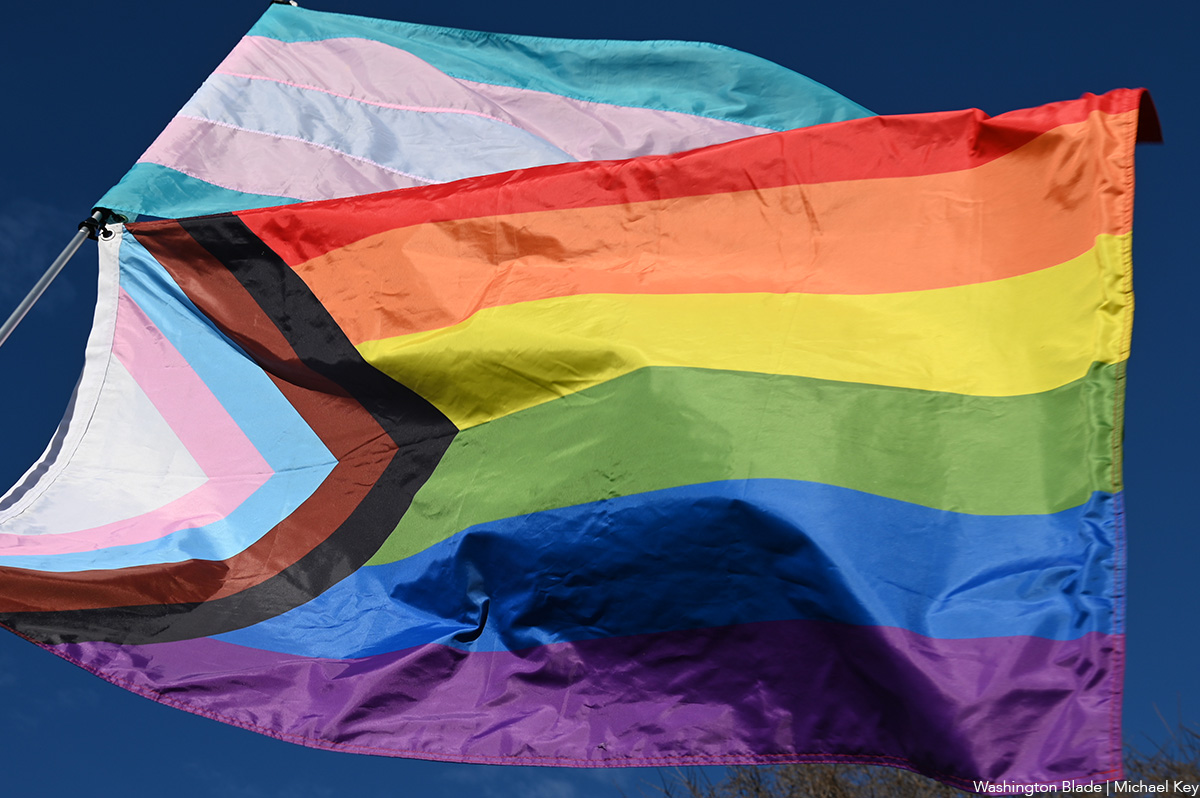
On Dec. 17th, the Williams Institute found that hate crimes targeting people based on their gender identity have more than tripled in California since 2013. The research center’s latest report on statewide gender identity hate crimes utilizes data reported to the California Department of Justice from 2001 to 2024, and outlines the increasing violence transgender and gender nonconforming people face.
Hate crimes motivated by gender identity and sexual orientation have made up 23% of all reported hate crimes in California since 2001, and nearly half of these incidents between 2013 and 2024 were reported in Los Angeles County alone. The study’s lead author, Jordan Grasso, points to several possible reasons for such high numbers in L.A., including the county’s overall population size, its large transgender community, and local law enforcement policies around identifying and reporting hate crimes.
It’s difficult to compare these numbers across counties, though, Grasso explained to the Blade, since practices like reporting, investigating, and recording incidents “are shaped at the local level and can vary widely from agency to agency.”
While these practices can vary, one overarching statewide shift occurred in 2013, when the California Department of Justice added “anti-gender nonconforming” as its own bias subcategory: one that was separate from “anti-transgender.” Since then, over 500 gender identity hate crimes targeting transgender and gender nonconforming people have been recorded in California.
This marked a step towards creating more nuance in the ways gender identity hate crimes are understood, reported, and responded to by law enforcement officials. Five years later, in 2018, California passed a law that required all law enforcement trainees to receive training on sexual orientation and gender identity.
“This matters because once someone reports a hate crime, officers who have a better understanding of these issues may be more likely to recognize the incident as a hate crime and record it as such, rather than treating it as a general offense,” Grasso wrote to the Blade.
As transgender and gender nonconforming people face increasing violence, they are also reporting lower levels of trust in police. They are more likely than cisgender people to experience discrimination, harassment, and bias when seeking help from law enforcement, which then discourages them from seeking help at all.
“There are clear gaps between transgender and nonbinary Californians’ experiences of violence and what shows up in official hate crime reports,” Grasso wrote. “These gaps are shaped in large part by longstanding and persistent negative interactions between LGBTQ people, especially transgender people, and law enforcement.”
Grasso found in another recent study that, while almost 60% of transgender and nonbinary survey respondents reported experiencing violence or harassment in the last year, their self-reported experiences may outnumber actual reported hate crimes. “This suggests that officially recognized hate crime reports capture only a small fraction of the violence and victimization that transgender and nonbinary people experience across the state,” they explained.
These gaps widen even more when considering transgender and gender nonconforming people who experience intersectional forms of hate. Transgender women, notably, face a disproportionate amount of violence and harassment, but current law enforcement recording policies around gender identity hate crimes can water these facts down.
Grasso explained that when law enforcement officers make hate crime reports, they are required to note a single “most serious bias,” a practice that aims to create one digestible explanation out of what are often very layered and complicated incidents of violence. “This has two consequences,” Grasso wrote. “First, gender identity hate crimes are likely undercounted, especially among people who are multiply marginalized. Second, patterns of victimization among people who are targeted for multiple, intersecting reasons—such as race and transgender identity—remain largely invisible.”
These limitations fuel new solutions, and several public policy recommendations are detailed in the report. Many of these suggestions urge improved data collection and access: namely, that law enforcement officials explain all applicable bias motivations in their hate crime reports to California’s Department of Justice. This way, researchers can better understand the scope and impact of those who are targeted by multiple biases.
The report’s authors are also supportive of the development of alternative options for reporting hate crimes because of the stigma and fear transgender and gender nonconforming people experience with law enforcement. Grasso points to CA vs. Hate, the California Civil Rights Department’s non-emergency resource and reporting hotline.
The local offshoot LA vs. Hate similarly provides a community-centered and non-law enforcement system that encourages Angelenos to report the hate crimes they experience and access various social services offered by grassroots organizations. This trust in community solutions also allows researchers to better comprehend and respond to increasing violence based on gender identity, as people are more willing to lean on these alternatives to share their stories.
Kristie Song is a California Local News Fellow placed with the Los Angeles Blade. The California Local News Fellowship is a state-funded initiative to support and strengthen local news reporting. Learn more about it at fellowships.journalism.berkeley.edu/cafellows.
Crime & Justice
San Fernando Valley LGBTQ+ community center Somos Familia Valle is trying to rebuild from a “traumatizing” break-in
This Monday, burglars stole $8,000 worth of essential materials from the organization.

In the early hours of Monday morning, burglars broke through three walls of the Sun Valley LGBTQ+ community center Somos Familia Valle. They rummaged through two main rooms and left with $8,000 worth of technology: 15 Chromebooks, two iPads, a camera, two microphones, and a large audio system that staff members used to host programs like Queer Yoga and Vogue Classes. “I was scared because I was wondering if it was a hate thing,” said Somos Familia Valle co-founder and president Kevin Al Perez.
Perez had woken that day with his usual routine of checking the building’s cameras and Wi-Fi systems remotely. Suddenly, he jolted after noticing they’d been turned off for hours. Since he was away, he asked his father to check on the space. “Everything’s fine,” his father replied, who said that the main door looked untouched.
After stepping inside, the damage became clear. Pieces of walls were torn out and strewn across the floor, items were hastily tossed aside, and the technology normally utilized for the center’s phone banking program, fitness classes, and community workshops were missing. “This is our first space,” Perez told the Blade, noting how devastating this break-in has been, both physically and mentally, for himself and his community members.
Somos Familia Valle began as a grassroots movement in 2014, when Perez and other LGBTQ+ locals noticed the absence of a Pride parade in the San Fernando Valley. Together, they organized a vibrant, joyous celebration of queer identity, planting the roots of what is now an intersectional space that uplifts and pours into the Valley’s diverse residents. For nearly a decade, they hosted programs at other community spaces, such as the Sherman Oaks East Valley Adult Center, before moving into their brick-and-mortar location on Sheldon Street.
With this physical space, Perez and Somos Familia Valle’s community organizer, Damiana Cano, have evolved that core mission with new branches. It is important for them to not only prioritize queer education and empowerment but also voter engagement mobilization, know your rights workshops, computer literacy classes, and physical health programs to fuel the safety and strength of people who seek support from the center.
“As someone who was born and raised in this community, I think it is so fulfilling and beautiful that LGBTQ people of all generations have a safe space to come together and create beautiful art here in the Northeast SFV,” Cano wrote to the Blade. “Over time, this…became more than a community; these people are my family.”
In response to the break-in, the community has stepped up. Perez opened a GoFundMe campaign, and within three days, it has surpassed its initial $8,000 goal. Right after the break-in, the center halted all programming. Now, with this wave of support, Perez says that these offerings, which include a TGI support group, mental health task force, Pride committee, and Queer Country will likely resume in January.
Somos Familia Valle will also move forward with their upcoming “Queer Together” holiday party, which will be held at their center on Sheldon Street. Perez told the Blade that the walls have been repaired, and he is determined to honor the resilience of the center and the people it serves. “It’s heartbreaking and traumatizing [but] they’re not going to take that away from us,” Perez said.
The break-in is currently under investigation by local law enforcement agents. To support Somos Familia Valle, their GoFundMe campaign is linked here.
Kristie Song is a California Local News Fellow placed with the Los Angeles Blade. The California Local News Fellowship is a state-funded initiative to support and strengthen local news reporting. Learn more about it at fellowships.journalism.berkeley.edu/cafellows.
Riverside County
Yesterday, Palm Desert residents shut down Councilmember’s “hateful” proposal to remove City’s Pride Month resolution
Mayor Pro Tem Joe Pradetto motioned to remove the Pride flag from City Hall, stating that the government “should not be in the business of celebrating one group’s private identity over another’s.”
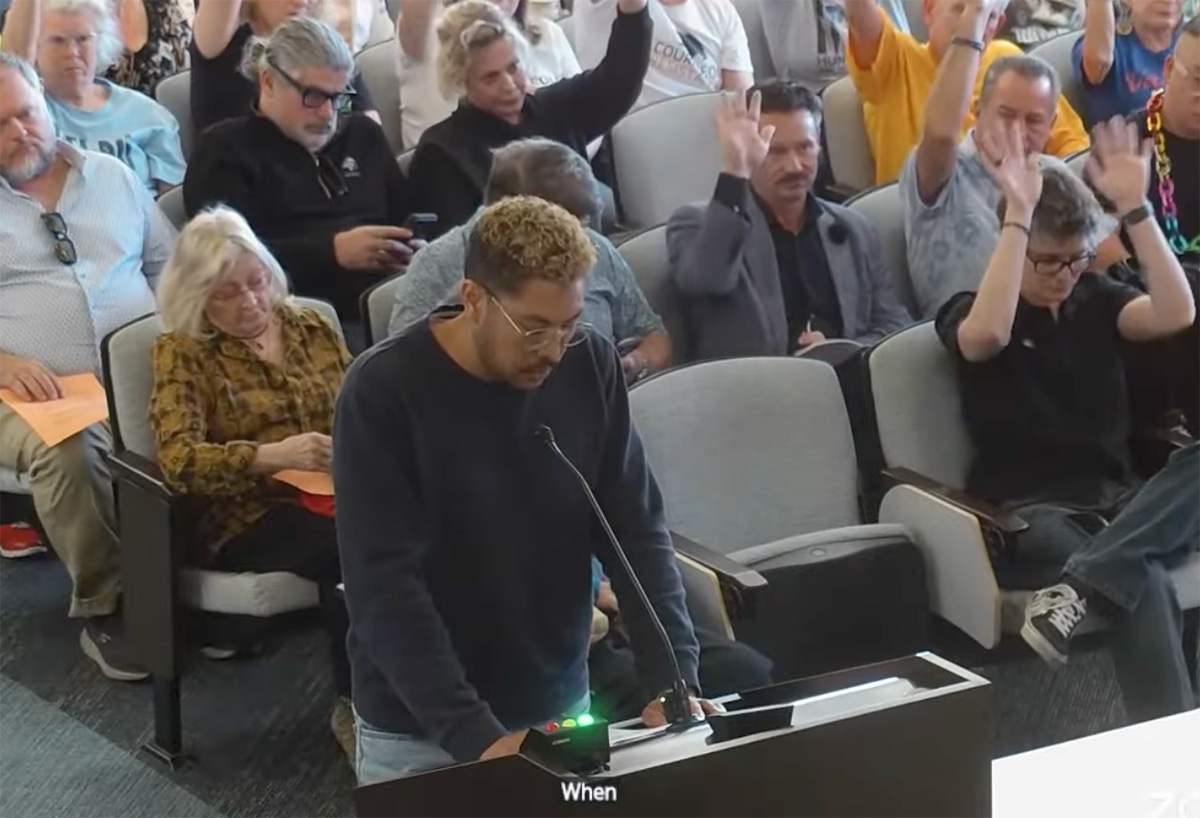
On Tuesday, Dec. 16th, a special city council meeting for Palm Desert, which rests in the Coachella Valley, opened up with a passionate public comment session that lasted for two hours. Resident after resident took to the podium, their voices tinged with outrage, to speak against recent moves made by Mayor Pro Tem Joe Pradetto to amend and rescind two City resolutions focused on diversity, inclusion, and LGBTQ+ pride.
These action items are outlined in a staff report that was prepared for yesterday’s special meeting. One included updating Resolution No. 2018-09, a formal statement that was adopted in 2018 to uphold the City’s commitment to nondiscriminatory policies. Pradetto motioned to edit a section of the resolution that initially focused on celebrating and learning from differences. He was in favor of changing this sentence to “the values that unite us” instead.
Pradetto also wanted to rescind Resolution No. 2024-038, which established for the City a policy related to LGBTQ+ Pride month commemorations last year. This includes the City’s issuing of a proclamation recognizing Pride Month and the displaying of a banner at City Hall in November, to coincide with local events like the neighboring Palm Springs Pride.
Pradetto claimed that the motivation for these motions came from “concerns…[about] unequal treatment” he received from community members about the Pride banner. After public comment concluded, Pradetto doubled down on his stance, stating that the government “should not be in the business of celebrating one group’s private identity over another’s.”
To this, queer residents like Bekz Lorton objected. “Actions like this proposal have given Palm Desert residents the power to treat us as less than human,” said Lorton, a programs manager at the LGBTQ Community Center of the Desert. “My existence is not a private identity, and I will not walk around in my hometown silenced, shunned or made invisible.”
Pradetto’s reframing of his motions to remove a resolution that promotes queer visibility as a step forward in inclusivity earned bitter laughs from the crowd. “Let the records show that today, Joe Pradetto took a stand for liberty, tolerance, and equality,” he stated, as attendants stared and guffawed in disbelief. Many argued that the sterile kind of “unity” he is trying to achieve is predicated on the alteration and removal of language and policies that explicitly protect the rights and visibility of marginalized community members.
“Recognizing one group does not prioritize a group over others, despite what you say,” resident Eugene Williams stated during public comment. “Recognition is not exclusion. Visibility is not favoritism. What that banner represented was safety, belonging and hope, especially for young people who are watching closely [as] to whether or not they matter in a place they call home.”
Towards the end of the meeting, Pradetto realized how outnumbered he was in his perspective and resolved that his motion would simply “die” without a seconding approval from the other councilmembers. To this, the crowd began to grow discontent. “Vote — don’t chicken out!” someone called out.
Councilmember Jan Harnik motioned to take no action on the resolutions, keeping their policies as they exist presently without any changes to how they are worded. The other councilmembers, including Gina Nestande, Karina Quintanilla, and Mayor Evan Trubee, voiced their unanimous support while Pradetto committed to his stance. He was the only “no” vote, and the motion passed to loud cheers and applause.
Resolutions No. 2018-09 and No. 2024-038 will remain as they are, in a victory bolstered by a great wave of community advocacy and support for queer identity. The win marks the continued importance of the Pride banner as a symbol for LGBTQ+ history, activism and resilience — one that will not be used to “score cheap political points by hurting others,” as stated by Palm Springs Pride in response to the situation.
Kristie Song is a California Local News Fellow placed with the Los Angeles Blade. The California Local News Fellowship is a state-funded initiative to support and strengthen local news reporting. Learn more about it at fellowships.journalism.berkeley.edu/cafellows.
Politics
LGBTQ Democrats say they’re ready to fight to win in 2026
Queer leaders warn Democrats not to abandon trans people
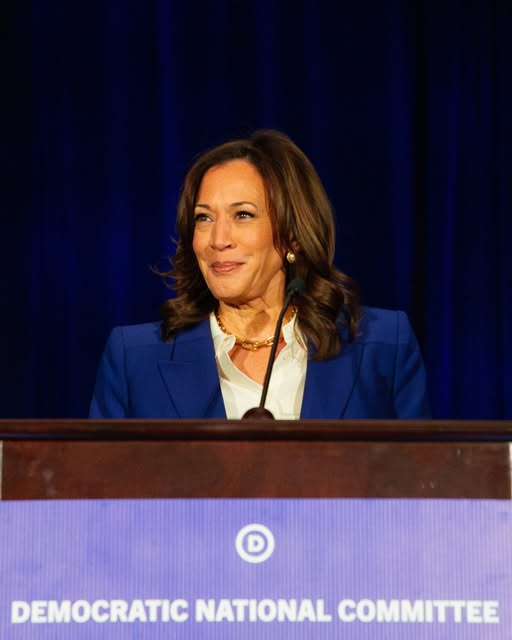
The Democratic National Committee held its annual winter meetings in Downtown Los Angeles over the weekend, and queer Democrats showed up with a clear message for the national organization: Don’t abandon queer and trans people.
Following last year’s disastrous presidential and congressional elections, many influential pundits and some powerful lawmakers called on Democrats to distance the party from unpopular positions on trans rights, in order to win swing districts by wooing more conservative voters.
But members of the DNC’s LGBTQ Caucus say that’s actually a losing strategy.
“There are still parts of our party saying we need to abandon trans people in order to win elections, which is just not provable, actually. It’s just some feelings from some old consultants in DC,” LGBTQ Caucus Chair Sean Meloy says.
Some national Democrats are already backtracking from suggestions that they walk back on trans rights.
California Governor Gavin Newsom grabbed national attention in March when he suggested that it was “deeply unfair” for trans girls to play in women’s sports. But last week, he doubled down on support for trans rights, claiming to have signed more trans-rights legislation than any governor in the country, and entering into feuds on X with Elon Musk and Nicki Minaj over his support for trans kids.
Democrats are also clearly feeling the wind in their sails recently after major election victories in Virginia and New Jersey last month, as well as victories in dozens of local and state legislative elections across the country in 2025.
“[Abigail] Spanberger in Virginia didn’t win by dodging the trans question. She won by attacking it, confronting it, and that’s how she got ahead,” says Vivian Smotherman, trans activist and at-large member of the DNC’s LGBTQ Caucus.
“Trans people are not a problem. We are a resource,” Smotherman says. “For my community, surviving into adulthood is not a guarantee, it’s an accomplishment. You don’t walk through a survival gauntlet without learning things… I’m not begging the DNC to protect my community. I’m here to remind you that we are the warriors tempered by fire, and we are fully capable of helping this party win.”
At its own meeting on Friday, the LGBTQ Caucus announced several new initiatives to ensure that queer and trans issues stay top of mind for the DNC as it gears up for the midterm elections next year.
One plan is to formalize the DNC’s Trans Advisory Board as distinct from the LGBTQ Caucus, to help introduce candidates across the country to trans people and trans issues.
“One in three people in this country know a trans person. Two-thirds of Americans don’t think they do,” Smotherman says. “So the real problem is not being trans, it’s that you don’t know us. You cannot authentically support a trans person if you’ve never met one.
“That’s why my first goal with this Trans Advisory Board is to host a monthly Meet a Trans Person webinar. Not as a spectacle, as a debate, but as a human connection, and I will be charging every state chair with asking every one of their candidates up and down the board if they know a trans person. And if that person doesn’t know a trans person, I’m gonna have that state chair put them on that webinar.”
The LGBTQ caucus is also opening up associate membership to allies who do not identify as LGBTQ, in order to broaden support and connections over queer issues.
It’s also preparing for the inevitable attacks Republicans will throw at queer candidates and supporters of LGBTQ issues.
“These attacks are going to come. You have to budget money proactively. You have to be ready to fight,” Meloy says. “There are some local party chairs who don’t want to recruit LGBTQ candidates to run because these issues might come up, right? That’s an absolutely ludicrous statement, but there are still people who need support in how to be ready and how to respond to these things that inevitably come.”
“The oldest joke is that Democrats don’t have a spine. And when they come after us, and we do not reply, we play right into that.”
Meloy also alluded to anti-LGBTQ tropes that queer people are out to harm children, and said that Democrats should be prepared to make the case that it’s actually Republicans who are protecting child abusers – for example, by suppressing the Epstein files.
“They are weak on this issue. Take the fight, empower your parties to say, ‘These people have nothing to stand on,’” Meloy says.
National
As house Democrats release Epstein photos, Garcia continues to demand DOJ transparency
Blade this week sat down with gay House Oversight Committee ranking member

Democrats on the House Oversight Committee have released new photos from Jeffrey Epstein’s email and computer records, including images highlighting the relationship between President Donald Trump and the convicted sex offender.
Epstein, a wealthy financier, was found guilty of procuring a child for prostitution and sex trafficking, serving a 13-month prison sentence in 2008. At the time of his death in prison under mysterious circumstances, he was facing charges of sex trafficking and conspiracy to traffic minors.
Among those pictured in Epstein’s digital files are Trump, former President Bill Clinton, former Trump adviser Steve Bannon, actor and director Woody Allen, economist Larry Summers, lawyer Alan Dershowitz, entrepreneurs Richard Branson and Bill Gates, and Andrew Mountbatten-Windsor.
One photo shows Trump alongside Epstein and a woman at a Victoria’s Secret party in New York in 1997. American media outlets have published the image, while Getty Images identified the woman as model Ingrid Seynhaeve.
Oversight Committee Democrats are reviewing the full set of photos and plan to release additional images to the public in the coming days and weeks, emphasizing their commitment to protecting survivors’ identities.
With just a week left for the Justice Department to publish all files related to Epstein following the passage of the Epstein Files Transparency Act, which requires the Justice Department to release most records connected to Epstein investigations, the Washington Blade sat down with U.S. Rep. Robert Garcia (D-Calif.), the ranking member on the Oversight Committee to discuss the current push the release of more documents.
Garcia highlighted the committee’s commitment to transparency and accountability.

“We’ve said anything that we get we’re going to put out. We don’t care who is in the files … if you’ve harmed women and girls, then we’ve got to hold you accountable.”
He noted ongoing questions surrounding Trump’s relationship with Epstein, given their long history and the apparent break in friendship once Trump assumed public office.
“There’s been a lot of questions about … Donald Trump and Jeffrey Epstein. They were best friends for 10 years … met women there and girls.”
Prior to Trump’s presidency, it was widely reported that the two were friends who visited each other’s properties regularly. Additional reporting shows they socialized frequently throughout the 1990s and early 2000s, attending parties at Trump’s Mar-a-Lago resort in Florida and Epstein’s residences. Flight logs from an associate’s trial indicate Trump flew on Epstein’s private jet multiple times, and Epstein claimed Trump first had sex with his future wife, Melania Knauss, aboard the jet.
“We’ve provided evidence … [that leads to] questions about what the relationship was like between Donald Trump and Jeffrey Epstein.”
Garcia stressed the need for answers regarding the White House’s role in withholding information, questioning the sudden change in attitude toward releasing the files given Trump’s campaign promises.
“Why is the White House trying to cover this up? So if he’s not covering for himself … he’s covering up for his rich friends,” Garcia said. “Why the cover up? Who are you hiding for? I think that’s the question.”
He confirmed that Trump is definitively in the Epstein files, though the extent remains unknown, but will be uncovered soon.
“We know that Trump’s in them. Yeah, he’s been told. We know that Trump’s in them in some way. As far as the extent of it … we don’t know.”
Garcia emphasized accountability for all powerful figures implicated, regardless of financial status, political party, or personal connections.
“All these powerful men that are walking around right now … after abusing, in some cases, 14‑ and 15‑year‑old girls, they have to be held accountable,” he said. “There has to be justice for those survivors and the American public deserves the truth about who was involved in that.”
He added that while he is the ranking member, he will ensure the oversight committee will use all available political tools, including subpoenas — potentially even for the president.
“We want to subpoena anyone that we can … everyone’s kind of on the table.”
He also emphasized accountability for all powerful figures implicated, regardless of financial status, political party, or relationship with the president.
“For me, they’re about justice and doing the right thing,” Garcia said. “This is about women who … were girls and children when they were being abused, trafficked, in some cases, raped. And these women deserve justice.”
“The survivors are strong.”
Deputy White House Press Secretary Abigail Jackson issued a statement regarding the release the photos, echoing previous comments from Republicans on the timing and framing of the photos by the Oversight Committee.
“Once again, House Democrats are selectively releasing cherry-picked photos with random redactions to try and create a false narrative,” Jackson said.
“The Democrat hoax against President Trump has been repeatedly debunked and the Trump administration has done more for Epstein’s victims than Democrats ever have by repeatedly calling for transparency, releasing thousands of pages of documents, and calling for further investigations into Epstein’s Democrat friends,”
In a press release on Friday, Garcia called for immediate DOJ action:
“It is time to end this White House cover-up and bring justice to the survivors of Jeffrey Epstein and his powerful friends. These disturbing photos raise even more questions about Epstein and his relationships with some of the most powerful men in the world. We will not rest until the American people get the truth. The Department of Justice must release all the files, NOW.”





(Photo courtesy of the U.S. House Oversight Committee)
-

 Minnesota1 day ago
Minnesota1 day agoReports say woman killed by ICE was part of LGBTQ community
-

 Commentary2 days ago
Commentary2 days agoRepeal now, regret later: Section 230 is up for elimination, and it’s not the platforms who will pay the price
-
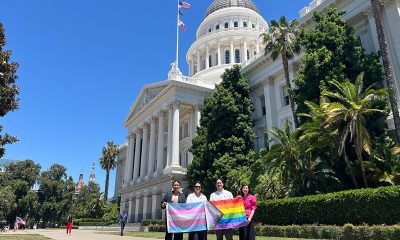
 Features3 days ago
Features3 days ago“We deserve to have a future here”: How we can support queer AAPI communities in 2026
-

 a&e features5 days ago
a&e features5 days agoQueer highlights of the 2026 Critics Choice Awards: Aunt Gladys, that ‘Heated Rivalry’ shoutout and more
-

 a&e features2 days ago
a&e features2 days ago‘The Golden Girls’ writer Stan Zimmerman reflects on 40th anniversary, coming out, and working with Roseanne Barr
-

 National5 days ago
National5 days agoTop 10 LGBTQ national news stories of 2025
-

 Events3 days ago
Events3 days agoGlowing tigers and butterflies will light up LA Pride’s first event this year at L.A. Zoo
-
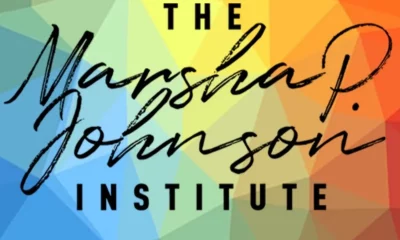
 LGBTQ Non-Profit Organizations2 days ago
LGBTQ Non-Profit Organizations2 days agoPassing the brick: How MPJI is centering Black and Brown trans voices
-

 Viewpoint3 days ago
Viewpoint3 days agoFrom closeted kid to LGBTQ+ journalist: queer community is my guiding light
-

 Movies2 days ago
Movies2 days agoTig Notaro & Zack Snyder’s hot lesbian action film






